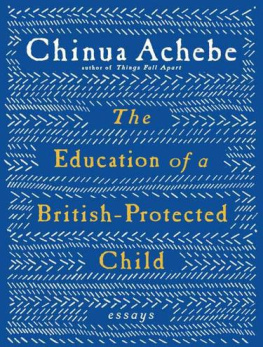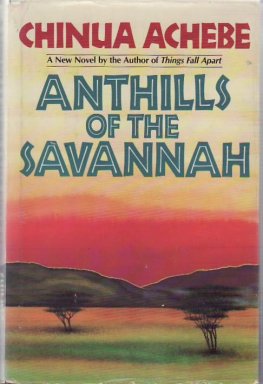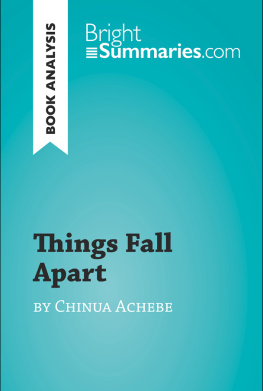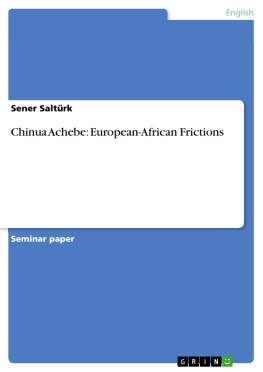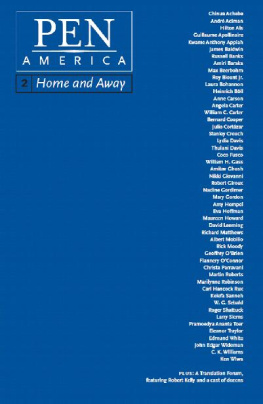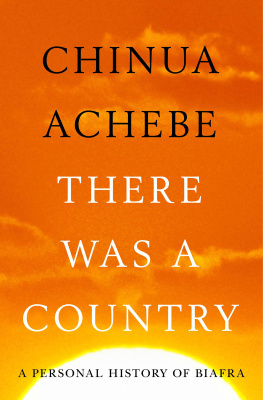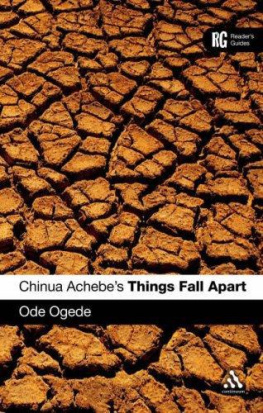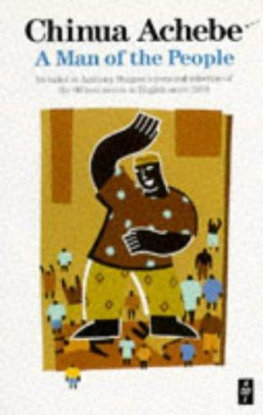Also by Chinua Achebe Anthills of the Savannah
The Sacrificial Egg and Other Stories
Things Fall Apart
No Longer at Ease
Chike and the River
A Man of the People
Arrow of God
Girls at War and Other Stories
Beware Soul Brother
Morning Yet on Creation Day
The Trouble with Nigeria
The Flute
The Drum
Home and Exile
Hopes and Impediments
How the Leopard Got His Claws (with John Iroaganachi)
Winds of Change: Modern Short Stories from Black Africa (coeditor)
African Short Stories (editor, with C. L. Innes)
Another Africa (with Robert Lyons)

For Charles P. Stevenson, Jr.
Contents
Preface
In 2008, my first novel, Things Fall Apart , celebrated its fiftieth anniversary. Many people in different parts of the world joined in the festivities; it was quite a season. There were big intellectual conventions and small street-side performances. The people of my Nigerian hometown, Ogidiwhich we still fondly call a villagewent completely out of their way in originality and sheer audacity. They checked their stock, and took an ancient festival called Nwafor and turned it into the celebration of a book.
Was this reinvention of our regional festival a challenge to our ancestors and gods? In such dangerous situations, Ogidi people draw upon their wisdom and step carefully. Of all the festivities available to them, they chose Nwafor, a secular celebration dedicated to play and fun, feasting and fellowship; they avoided feuding deities. It was this joyful annual festival that Ogidi people decided to offer to Things Fall Apart , a book celebrating the immemorial customs of Ogidi for the first time in written fiction!
As the festival got underway, the old men and women of the town were perhaps puzzled by the events swirling around them, but not so their children, who were ready to embrace a more modern approach. I am told that a very talented actorwho had once played the role of Okonkwo with great success in a theatrical interpretation of Things Fall Apart performed in the state capitalwas brought to the Ogidi town hall. There, his every step was cheered by the villagers. They could accept and recognize the unusual events going on around them, both about a book and everything else we now call our history.
During these celebrations, I thought also about this new book, a collection of essays that spans my career as a writer. I had high hopes for it. I wanted very much to shine the torch of variety and of difference on the experiences my life has served up to me, illuminating what it is that unites my writing and my personal life. I knew this would be hard to do; the books success would depend on what seamless effect I might contrive to tie these experiences together. This book would have to deal with real individual people, times, and topics. But there was no list that I was trying to complete, no group that I was making it my business to study from. This book would be personal and eclectic, therefore one could not look to it with scholarly intentions to learn about me completely.
I began to pull together the various pieces. The essay called My Daughters took its place without a fuss. I continued, working on other subjects, until my editor read the collection and asked me, What about the boys? I knew immediately that the next question would be: Where is your wife? and that my entire scheme for this collectionwhich passed over certain aspects of my lifewas untenable. Would I also leave out the motor accident that, in 1990, cost me the use of my legs? What would I tell about the accidentexcept that my son and I were in the backseat and that it was he who, unable to roll the car away from me, rushed back to the road and shouted my name so that every car stopped and they took me to a hospital If my son hadnt been there it would have been a different story.
My wife, Christie, was teaching her favorite counseling class to graduate students at the University of Nigeria when they brought her the news of my accident. She put her professional life on hold then and there; and now. It was Christie and our two girlsChinelo and Nwandoand two boysIkechukwu and Chidiwho saw me through. Would Icould Iwrite about all of this? No, I knew this book would have gaps and deletions as topics and essays moved naturally from one to the next.
As I completed the book, an invitation I had earlier received from the Library of Congress in Washington, D.C., served as an opportunity to bring together the events from my past with some thoughts of the future. The library had asked me to join them in celebrating the anniversary of Things Fall Apart , as well as my seventy-eighth birthday. When this occasion arrived, I was very well received by the staff of the library. They couldnt stop telling me how proud they were that I was actually present. The date was November 3, 2008.
I had a full house. An incredible drummer from Cameroon held us in his spell. I read my poems and signed copies of my books. Then, to a great burst of applause, I watched a huge birthday cake coming up the ramp slowly towards me. All I could say by way of speech was: Is this what you normally do? I dont know what answer I expected. But I remember a most extraordinary comment made to me earlier that day by an African-American lady. She had thanked me once again for my visit and added, with an element of both bargain and folklore: And tomorrow we shall elect an African president for you.
It is likely that in years to come folks will be asking their fellows what they were doing when Barack Obama was elected president. I hope we shall not be asking where we were or what we were doing but what the news did to us.
Chinua Achebe
Annandale-on-Hudson, New York
2009
The Education of a British-Protected Child
The title I have chosen for these reflections may not be immediately clear to everybody and, although already rather long, may call for a little explanation or elaboration from me. But before I get to that, I want to deal with something which gives me even more urgent cause for worryits content.
I hope my readers are not expecting to encounter the work of a scholar. I had to remind myself, when I was invited to give this address, that if they think you are a scholar, it must mean you are a scholar, of sorts. I say this up front, as Americans would put it, to establish the truth quite early and quite clearly in case somehow a mistake has been made.
Though I would much rather have a successful performance than the satisfaction of being exonerated in failure, I cannot help adding that failure, sad as it would be, might also reveal the workings of poetic justice, because I missed the opportunity of becoming a clear-cut scholar forty years ago when Trinity College, Cambridge, turned down my application to study there after I took my first degree at the new University College, Ibadan. My teacher and sponsor from Ibadan had been a Cambridge man himselfone James Welch, about whom I shall say a few more words later. Anyhow, I stayed home then, and became a novelist. The only significant if of that personal history is that you, ladies and gentlemen, would be reading a scholarly essay today rather than an impressionistic story of a boys growing up in British colonial Nigeria.
As you can see already, nothing has the capacity to sprout more readily or flourish more luxuriantly in the soil of colonial discourse than mutual recrimination. If I become a writer instead of a scholar, someone must take the rap. But even in such a rough house, masked ancestral spirits are respected and accorded immunity from abuse.
In 1957, three years after my failed Cambridge application, I had my first opportunity to travel out of Nigeria to study briefly at the BBC Staff School in London. For the first time I needed and obtained a passport, and saw myself defined therein as a British Protected Person. Somehow the matter had never come up before! I had to wait three years more for Nigerias independence in 1960 to end that rather arbitrary protection.
Next page
